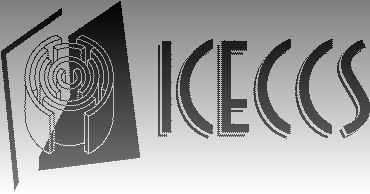 |
Fifth IEEE International Conference on Engineering of Complex Computer Systems
|
 |
Fifth IEEE International Conference on Engineering of Complex Computer Systems
|
Flamingo Hilton Hotel, Las Vegas, Nevada, October 18-21, 1999
Featuring keynote presentations
by:
Alan Davis,
Omni-Vista
Carlo Ghezzi,
Computer Science Department, Politecnico di Milano
John Musa,
International Senior Consultant, Software Reliability Engineering
The 1999 Software Engineering
Standards Committeee (SESC) annual
meeting is colocated with
ICECCS'99
| Preliminary Advance Program | |
| The 1999 Software Engineering Standards Committeee | |
| Tutorials | |
| Conference Registrations | |
| Hotel Reservations |
SCOPE: Complex
computer systems are common in many sectors, such as manufacturing, communications,
defense, transportation, aerospace, hazardous environments, energy, and
health care. These systems are frequently distributed over heterogeneous
networks, and are driven by many diverse requirements on performance, real-time
behavior, fault tolerance, security, adaptability, development time and
cost, long life concerns, and other areas. Such requirements frequently
conflict, and their satisfaction therefore requires managing the trade-off
among them during system development and throughout the entire system life.
The goal of this conference is to bring together industrial, academic,
and government experts from a variety of user domains and software disciplines,
to determine how the disciplines' problems and solution techniques interact
within the whole system. Researchers, practitioners, tool developers and
users, and technology transition experts are all welcome.
Keynote Presentations:Planning Complex Systems in a Business ContextAlan Davis, Omni-Vista, USA Complexity in Human Centered Systems: The
Case of Software Processes
Developing More Reliable Software Faster
and Cheaper
Research Paper Track:Session 1: Collaboration and DistributionSecuring Internet Sessions with Sorbet.Fred Long, Scott A. Hissam, John Robert, and Robert C. Seacord, Software Engineering Institute, U.S.A. A CSCW Framework for the Flexible Coupling
of Groupware Widgets.
A General Purpose Virtual Collaboration Room.
Session 2: Representing Complex Systems and ProcessesA Framework for Analyzing Configurations of Deployable Software Systems.Dennis Heimbigner, Richard S. Hall, and Alexander L. Wolf, University of Colorado, U.S.A. UML + ROOM as a Standard ADL?
An Integrating Approach for Developing Distributed
Software Systems - Combining Formal Methods, Software Reuse, and the Experience
Base Concept.
Session 3: Performance and Tradeoff AnalysisEvaluating a Flexible Architecture for Distributed Control.P. Bellini, A. Buonopane, M. Montanelli, and P. Nesi, Special Electronic Design and University of Florence, Italy. Performance Analysis of Traffic Networks Based
on Stochastic Timed Petri Net Models.
|
On Cost Function Synthesis For Multi-Objective
Design Decisions in Complex Real-Time Systems.
Carlos C. Amaro, Roman Nossal, and Alexander D. Stoyen, New Jersey Institute of Technology and University of Nebraska at Omaha, U.S.A. Session 4: Applying Formal Methods to Complex SystemsFormal Development and Validation of Java Dependable Distributed Systems.Giovanna Di Marzo Serugendo, Nicolas Guelfi, Alexander Romanovsky, and Avelino Francisco Zorzo, University of Newcastle upon Tyne, U.K. A Realistic Architecture for Timed Testing.
Criteria for Generating Specification-based
Tests.
Industrial Experience Report Track:Lessons Learned From Wrapping Systems.Christopher Landauer, Kirstie L. Bellman, The Aerospace Corporation, U.S.A. A CORBA-Based Architecture for Integrating
Distributed and Heterogeneous Databases.
Practical Considerations in Protocol Verification:
The E-2C Case Study.
PanelsComplexity MeasurementPanel Chair - Paolo Nesi, University of Florence, Italy. Other Panels, State of the Art Presentations:To be announcedICECCS'99 Conference ChairsJohn Harauz, Ontario Power Generation, Inc. john.harauz@ontariopowergeneration.com Vice General Chair:
Program Co-Chairs:
Shaoying Liu , Hiroshima City
University, Japan
Steering Committee Chair:
|
| The 1999 Software Engineering Standards Committeee (SESC) annual meeting is colocated with ICECCS'99. SESC attendees will be allowed to participate in ICECCS keynote speaker sessions for free. If they wish they can participate in ICECCS'99 social activities by purchasing reception and banquet tickets at incremental cost. There are no registration requirements for SESC meeting attendees as the meeting is separate, and parallel, to the ICECCS'99 sessions. Hotel registration though, must be made using the ICECCS'99 registration form.For more detailed information on SESC activities please visit http://www.computer.org/standard/sesc |
| Software Reliability Engineering
John Musa, International Senior Consultant |
(Full Day) | |
| This tutorial quickly, efficiently teaches you step by step the essentials of how to apply the standard, proven, widespread best practice of Software Reliability Engineering (SRE) to your project. SRE helps you develop and test more reliable software faster and cheaper. SRE is based on two powerful ideas: (1) Quantitatively characterize expected use and then focus resources on most used and/or most critical functions. This increases development efficiency and hence effective resource pool available to add customer value to product. (2) Further increase customer value by setting quantitative reliability objectives that precisely balance customer needs for reliability, timely delivery, and cost; engineer project strategies to meet them; and track reliability in test as a release criterion You can apply SRE to the next release of any system / component that uses software. | ||
| Using Design Patterns, Frameworks and CORBA
to Reduce the Complexity of Developing Reusable Large-Scale Object-Oriented
Concurrent Communication Components and Systems
Douglas C. Schmidt, Washington University in St. Louis, USA |
(Full Day) | |
| Developing high quality communication
software is hard; developing high quality reusable communication software
is even harder. The principles, methods, and skills required to develop
reusable software cannot be learned by generalities. Instead, developers
must learn through experience how reusable software components and frameworks
can be designed, implemented, optimized, validated, maintained, and enhanced
by applying good development practices and patterns.
This tutorial describes OOD/OOP techniques and software that have been successfully used to reduce the complexity of developing large-scale concurrent communication systems, including online transaction processing, telecommunication call-processing, network management for large-scale global personal communication systems, electronic medical imaging systems, real-time avionic systems, and high-performance parallel communication protocol stacks, among others. Two types of software complexity are addressed: complexity due to quality of service (QoS) requirements and complexity due to functional and quality requirements. The techniques that can significantly simplify and enhance the development, use, and reuse of communication software include object-oriented design (such as patterns, layered modularity, and information hiding), C++ language features (such as abstract classes, inheritance, dynamic binding, and parameterized types), tools (such as object-oriented communication frameworks) and Object Reuse Brokers (ORBs), advanced operating system mechanisms (such as event de-multiplexing, multi-threading, multi-processing, and explicit dynamic linking), and emerging standards for distributed object computing such as OMG CORBA and Distributed COM (DCOM). |
||
| Implementing Large-Scale Systems Using COTS
Mark Vigder and John Dean, National Research Council of Canada, Canada |
(Half Day) | |
| This tutorial identifies some of the issues associated
with the use of commercial off-the-shelf (COTS) software in long-lived
complex computer systems, and describes tools and techniques in acquiring,
developing and managing such systems. The discussions will focus
on the practical aspects of management and implementation of these systems.
The course is applicable to researchers, developers and managers.
This tutorial is organized in three sessions. The first session looks at how architectural issues impact the long-term operational management of a COTS based system. By properly designing a system, the operational costs can be reduced over a system's lifetime. The second session is devoted to consideration of options in evaluating candidate COTS products for use as sub-components of major systems. I will discuss current proposed methodologies and will point out advantages and disadvantages of each. I will look at possible tools to support evaluation in the context of the system to be developed. The third session highlights a set of desirable architectural properties for facilitating the operational management of a system. An inspection checklist for verifying the presence of these properties will be presented. |
||
| A Realistic Commercially Robust Process for
the Development of Object-Oriented Software
Timothy Korson |
(Half Day) | |
| The successful use of object technology requires far more than simply the adaptation of UML, Java, CORBA, or ActiveX. It is crucial to understand the process of how to use these notations and technologies to build commercially robust software systems. In this session the speaker draws from his experience at NASA, NORTEL, AT&T, IBM, and other leading companies to illustrate the pitfalls and best practices of the process of OO software development. Attendees walk through the complete development process from use case development to pattern application and coding. Participants gain a clear understanding of the distinction between domain models, application models, and architectures. The course goes beyond notation and cookbook methods to address the key principles of Object-Oriented Software Development. A percentage of the time is spent discussing the rationale underlying each step of the process so that engineering concepts behind the specific techniques is presented. Several case studies are woven through the presentation. |
ICECCS 99 Registration Fees
|
|
|
|
|||||||
|
|
|
|
|
|
|
||||
| Conference |
|
|
|
|
|
|
|||
| Tutorial Half Day |
|
|
|
|
|
|
|||
| Tutorial Full Day |
|
|
|
|
|
|
|||
| (*) Advisor signature required
Exhibitors must contact Anita Andler for information and fees You may register via web, regular mail, or fax. The registration page is available for download or view here in pdf, or ps format. Please fax or mail this form with payment by 27 September 1999 to: |
| IEEE Computer Society
Attn: ICECCS'99 Registration Dept. 6006 Washington, D.C. 20042-6006 Tel.: +1 202 371 1013 (Sorry, no phone registrations) Fax: +1 202 728 0884 |
 |
Flamingo
Hilton Las Vegas
3555 Las Vegas Boulevard South Las Vegas, Nevada 89109 Tel: +1 702 733 3111 (Reservations accepted from 8.30 a.m. to 5.00 p.m. CST) 1 800 445 8667 Fax: +1 702 733 3353 |
 |
ICECCS 99 Room Rates:
| Single | $ 99 |
| Double | $ 99 |
| Hotel reservations can be made via regular
mail, fax, or the toll free number provided above. Be sure to mention 'ICECCS
99' when placing your reservation to qualify for our attractive group rates.
The registration page is also available for download or view here in pdf,
and ps format.
Reservations must be made by Friday, 24 September 1999. Reservations made after this date are subject to availability of rooms and rates. |